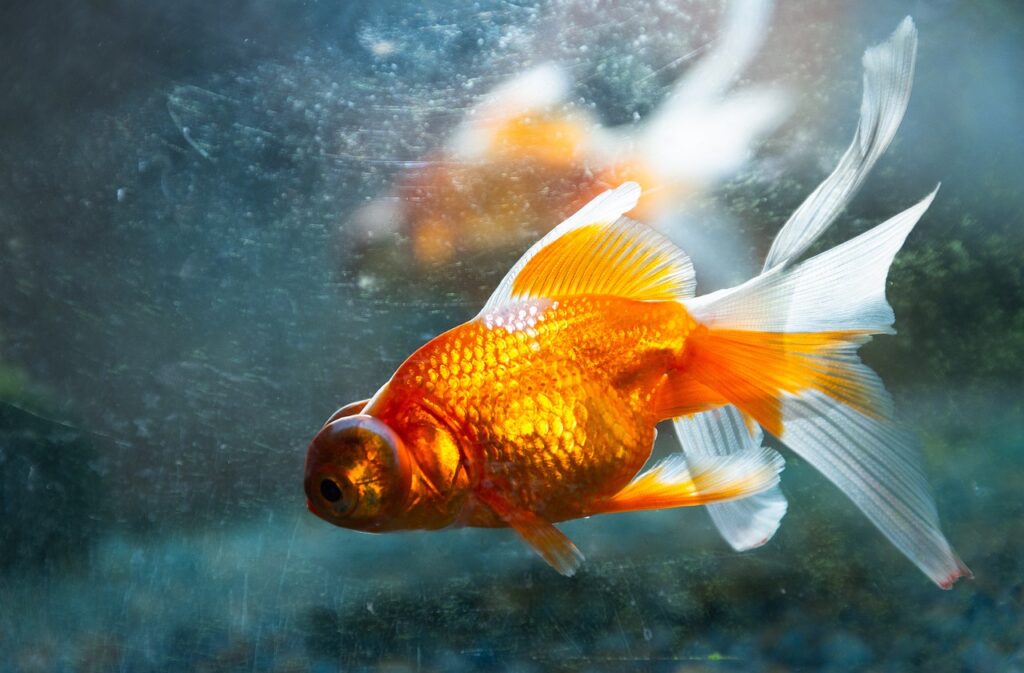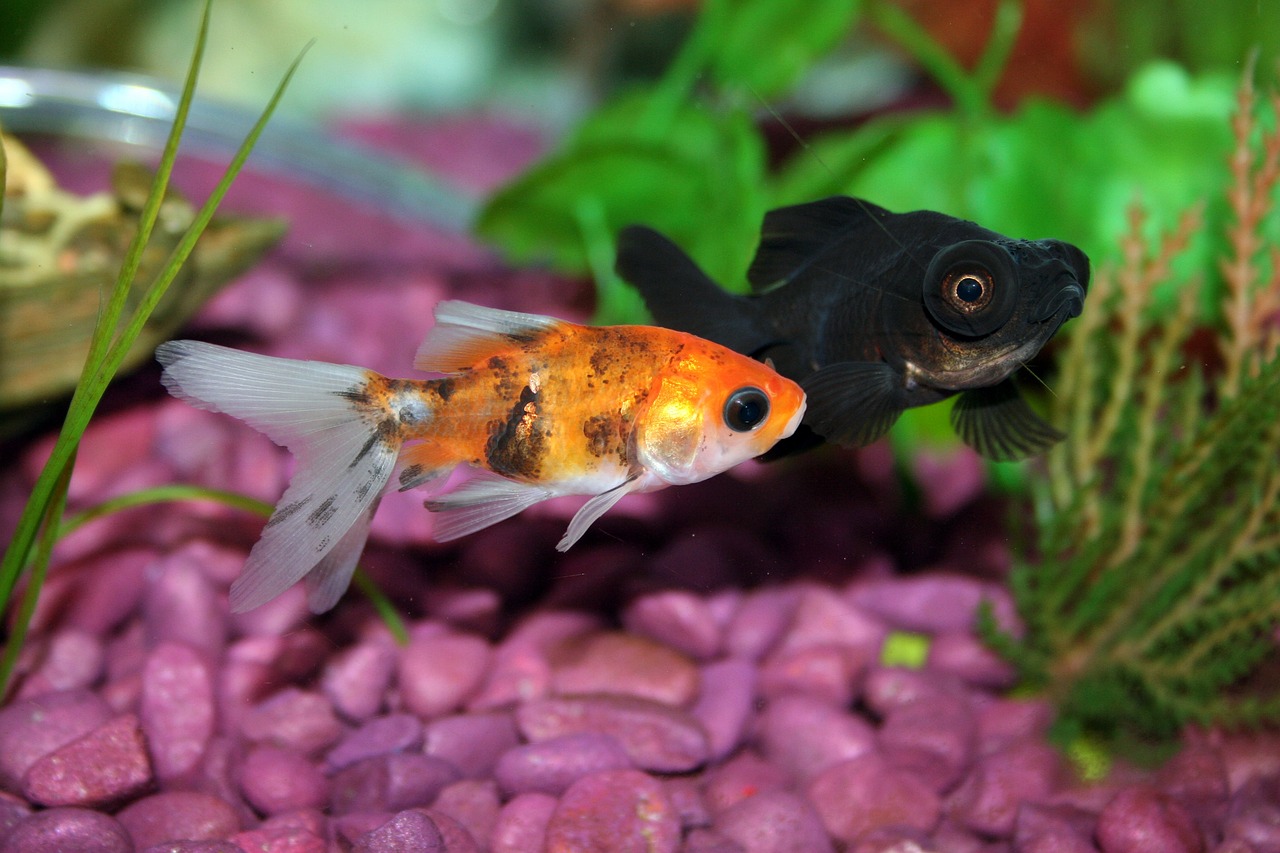Overfeeding Goldfish
Overfeeding goldfish is a common issue many goldfish owners encounter, and it can lead to several serious health problems for your aquatic pets. The primary consequence is that an excess of food in the tank can compromise your goldfish’s well-being, as it affects the aquarium’s water quality. Goldfish do not have a stomach like humans; instead, they possess a straight intestine that digests food as it passes through. This anatomical trait means they can eat continuously but should not be overfed. Overfeeding goldfish frequently leads to uneaten food settling at the bottom of the tank, contributing to waste buildup.
The excess food decomposes and produces harmful substances such as ammonia, which pollutes the water. Elevated ammonia levels can stress your goldfish and make them prone to diseases, as it compromises their immune system. Algae growth can also become a problem as extra nutrients in the water facilitate its proliferation. Identifying overfeeding early can help prevent significant damage to your goldfish and the aquarium environment. Typical signs include cloudy water, which results from decomposing food particles and increased bacterial activity. Another indicator is excessive fish waste, as goldfish that are overfed produce more feces.
To ensure a healthy aquarium, it is essential to understand the correct feeding practices for goldfish. Providing the right amount of food at the right frequency can make all the difference between a thriving, vibrant goldfish tank and one that struggles with common overfeeding issues. Understanding the impacts and signs of overfeeding goldfish can lead to better care techniques and a more enjoyable fish-keeping experience. A well-maintained environment will ultimately result in happier and healthier goldfish, enriching their lives and your experience as a goldfish keeper.

How to Properly Feed Goldfish
Properly feeding goldfish is essential to prevent problems like overfeeding goldfish, which can lead to serious health issues. Goldfish require a balanced diet to thrive in the aquarium environment. To avoid overfeeding goldfish, it’s crucial to follow specific feeding guidelines and provide appropriate food types.
The optimal way to feed goldfish is to provide small amounts of food that they can consume within two to three minutes. Goldfish have small stomachs and cannot digest excessive amounts of food at once. Pellets and flakes are the most common types of goldfish food available in the market. Ensure you select high-quality products to maintain the health of your fish. Feed your goldfish once or twice a day, spacing out the feedings to prevent overfeeding goldfish.
Monitoring the fish’s behavior and the aquarium environment is critical. Observe if there is leftover food after feeding as it may indicate overfeeding goldfish. In addition to pellets and flakes, you can include occasional treats such as blanched vegetables or live foods like brine shrimp. This variety prevents boredom and provides the necessary nutrients and fiber.
Always follow a strict feeding schedule and avoid spontaneous extra feeds to prevent overfeeding goldfish. Maintaining a clean tank is equally important as excess food leads to water quality issues and algae growth. Regularly clean the aquarium and perform water changes to keep the environment healthy for your goldfish. By adhering to these feeding practices, you can ensure your goldfish stay healthy and active. Remember, the key to avoiding overfeeding goldfish is consistency and observation.

Signs of Overfeeding Goldfish
Overfeeding goldfish can lead to several noticeable signs that indicate your fish might be receiving more food than is necessary. Observing these signs early is crucial for maintaining a healthy aquarium environment. One of the primary signs of overfeeding goldfish is cloudy water. Excess food decomposes and increases ammonia levels, which clouds the water and compromises its quality. High ammonia levels can be detrimental to the health of your goldfish.
Another common sign is abnormal swimming behavior. Overfed goldfish often display erratic swimming patterns, including swimming upside down. This can be a symptom of swim bladder issues, which are frequently caused by overfeeding and lead to bloating. Bloating and excessive feces are also indicators of overfeeding goldfish. When goldfish consume too much food, their digestive system becomes overburdened, leading to bloating. Additionally, you might notice an increased amount of waste in the aquarium, which is a clear sign that your fish are eating more than they can process efficiently.
If you notice a surge in algae growth, overfeeding might be the cause. Uneaten food and increased fish waste provide an abundant nutrient source for algae, causing it to proliferate. Algae not only make your aquarium unsightly but can also disrupt the chemical balance of the water. In conclusion, being vigilant about the signs of overfeeding goldfish—such as cloudy water, abnormal swimming, bloating, excessive feces, and algae growth—can help you take the necessary steps to adjust feeding practices and ensure a healthy environment for your goldfish. By addressing overfeeding promptly, you protect the well-being of your aquatic pets and maintain a more enjoyable aquarium experience.

Problems Associated with Overfeeding
Overfeeding goldfish is a common problem that can lead to a multitude of health issues and environmental challenges in your aquarium. When goldfish consume more food than they need, excess food decomposes, leading to poor water quality. One of the first issues that arise from overfeeding goldfish is elevated ammonia levels. Ammonia is toxic to goldfish and can cause severe health issues or even death if not managed properly. Additionally, overfeeding can compromise the water quality in your aquarium. Excess food and waste materials result in cloudy water, which not only looks unattractive but can also harbor harmful bacteria.
Another problem associated with overfeeding goldfish is the development of swim bladder disorder. This condition causes buoyancy issues, making it difficult for goldfish to swim properly; they may float to the top or sink to the bottom. Swim bladder problems are frequently linked to constipation, another common consequence of overfeeding. Constipation in goldfish can be identified by a lack of fecal matter or long, stringy feces that are difficult for the fish to pass. Overfeeding can also lead to algae blooms in the aquarium.
Excess nutrients in the water create an ideal environment for algae to grow, which can further deteriorate the water quality and make the tank difficult to maintain. Behaviorally, overfeeding goldfish can cause lethargy. When goldfish are overfed, they may become less active and more prone to illness due to a weakened immune system. Bloating is another visual sign of overfeeding, as goldfish will appear swollen and uncomfortable. This condition can be painful for the fish and may require immediate dietary adjustments to resolve. Lastly, overfeeding goldfish can strain the bio-filter in your tank.
Filters can become clogged with excess food particles and waste, leading to inefficiency and potential breakdowns. Regular maintenance and monitoring are necessary to avoid these issues and keep your filter functioning effectively.
In summary, overfeeding goldfish results in numerous problems ranging from poor water quality and increased ammonia levels to constipation, swim bladder issues, and algae blooms. By being mindful of feeding practices and observing your goldfish’s behavior and health, you can prevent these detrimental effects and ensure a thriving aquarium environment.

How to Avoid Overfeeding
Overfeeding goldfish is a common issue among aquarium enthusiasts, but it can be avoided with proper feeding practices. To prevent overfeeding goldfish, it is essential to understand the appropriate portion sizes for your fish. Goldfish have small stomachs roughly the size of their eye, so feed them an amount they can consume within 2-3 minutes. A crucial guideline to remember is consistency in feeding times.
Instead of giving a large quantity of food once a day, it’s better to provide smaller portions multiple times a day. One way to avoid overfeeding goldfish is to use a variety of food types. Pellets, flakes, and occasional treats like freeze-dried worms can offer a balanced diet while preventing over-reliance on one type of food.
Close attention to the aquarium’s condition can also indicate whether you’re overfeeding your goldfish. Cloudy water, algae blooms, and residue at the bottom of the tank are signs of excess food. In addition to visual checks, bear in mind the health implications of overfeeding goldfish. Overfed goldfish often suffer from bloating, constipation, and swim bladder issues, which can all be avoided with mindful feeding.
Setting a feeding schedule and sticking to it can greatly minimize the risk of overfeeding. Using tools like automatic feeders can also help regulate portions, especially when you’re not around to feed the fish manually. Fasting your goldfish once a week is another method to prevent overfeeding goldfish. This aids in their digestive health and reduces the chances of constipation. It’s important to remember to clean your tank regularly. Excess food can compromise water quality, leading to ammonia spikes that are harmful to goldfish.
By following these practices, you can ensure your goldfish remain healthy and active, free from the problems associated with overfeeding. This will not only improve their quality of life but also make your aquarium maintenance more manageable.

Conclusion
Overfeeding goldfish can lead to numerous health issues and compromise the quality of the aquarium environment. By understanding the signs of overfeeding, such as cloudy water and bloating, goldfish owners can take preventive measures to ensure their fish remain healthy. It’s crucial to adhere to feeding guidelines and properly manage the quantity and type of food provided. At The Goldfish Tank, our goal is to provide accurate and engaging information to help you avoid overfeeding goldfish.
Remember that maintaining a balanced diet and monitoring your goldfish’s behavior can significantly improve their well-being and longevity. Staying informed and vigilant in your goldfish care practices will ensure a thriving aquatic life for your pet. Thank you for trusting The Goldfish Tank for all your goldfish care needs.
Frequently Asked Questions
There are many common questions among goldfish owners, particularly concerning overfeeding goldfish. Understanding these FAQs can help ensure you maintain proper care and avoid the pitfalls associated with overfeeding goldfish.
How Often Should I Feed Goldfish?
Goldfish should typically be fed once or twice a day. It’s crucial to give them only what they can consume in a few minutes to prevent overfeeding goldfish, which can cause various health issues. Read more.
What Types of Food Are Best for Goldfish?
A balanced diet for goldfish includes high-quality flakes, pellets, and some fresh foods like peas and spinach. Overfeeding goldfish with just one type of food can lead to nutritional deficiencies and overfeeding issues.
How Can I Tell If I’m Overfeeding My Goldfish?
Signs of overfeeding goldfish include cloudy water, excess waste, and an increase in algae in the tank. It’s important to monitor these signs regularly to avoid the negative impacts of overfeeding goldfish.
Can Overfeeding Goldfish Cause Health Problems?
Yes, overfeeding goldfish can lead to severe health problems. Issues such as swim bladder disease, constipation, and even death can occur if overfeeding is not controlled.
How Can I Prevent Overfeeding in My Aquarium?
To prevent overfeeding goldfish, use a feeding schedule and stick to it. Additionally, consider using a feeding ring to keep food in one area, making it easier to control portions.
Is It Okay to Fast My Goldfish?
Occasionally fasting your goldfish for a day can be beneficial and help prevent issues related to overfeeding goldfish. Fasting can aid in digestion and help reduce the buildup of waste in the aquarium. By keeping these FAQs in mind, you can significantly reduce the risks associated with overfeeding goldfish and ensure a healthier and happier aquatic environment for your pets.
